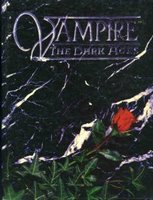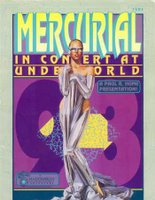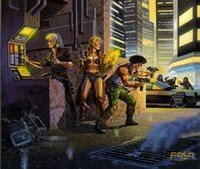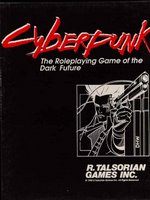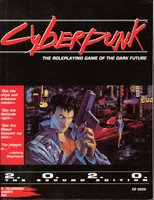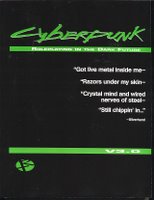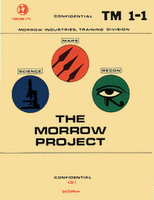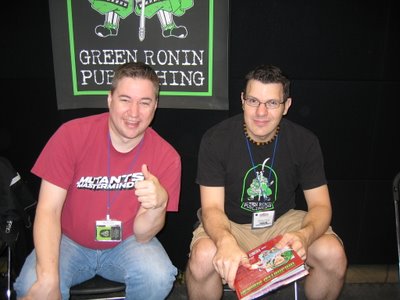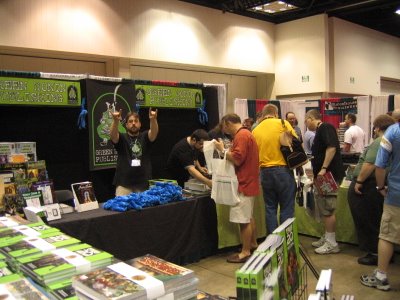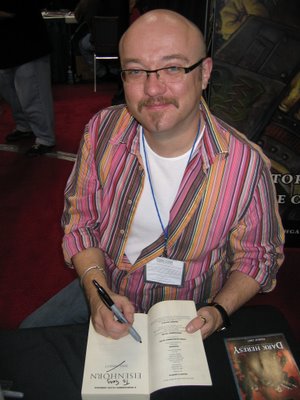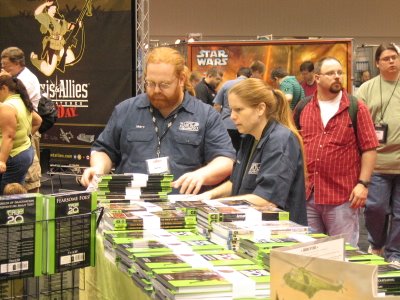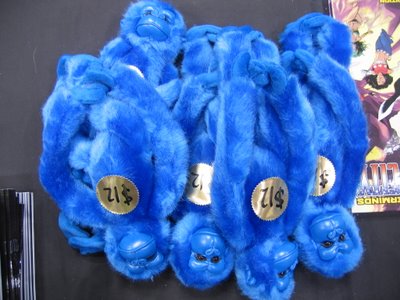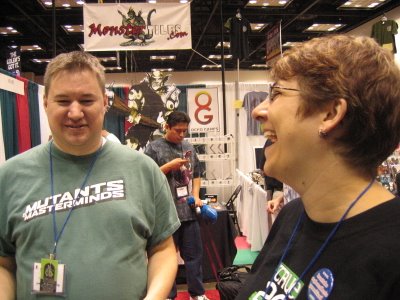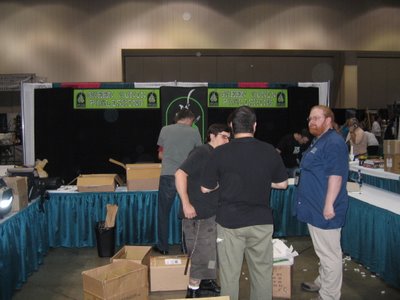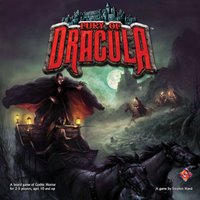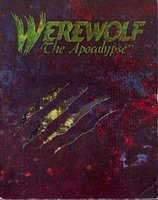 My friend CJ loved lycanthropes. You know, werewolves. When White Wolf released the first edition of Werewolf, he was all over it. He and I went to a local BK and went over character options and the like. I came up with Fianna hitch hiker, I think. Not much more can I recall, except that the adventure he ran me through had to do with defending a secluded farmhouse (and the family within) from bad guys.
My friend CJ loved lycanthropes. You know, werewolves. When White Wolf released the first edition of Werewolf, he was all over it. He and I went to a local BK and went over character options and the like. I came up with Fianna hitch hiker, I think. Not much more can I recall, except that the adventure he ran me through had to do with defending a secluded farmhouse (and the family within) from bad guys.Later on, with the advent of Werewolf, second edition he ran another, large campaign. I came in somewhat late, but it didn’t seem to matter. Though the mechanics and ideas behind Werewolf were interesting, I was a bit put off by the fundamentalist nature of the setting. I understand, that’s what they were aiming for. After all, the Garou are nothing if not religious fanatics.
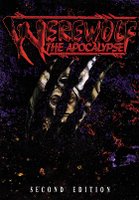 So, being me, I decided to play a Glasswalker galliard who moonlighted as an illegal arms merchant, and who didn’t have much use for the more religious aspects of Garou ideology. Customers were customers, after all. This did eventually come back to bite the character in the behind (almost literally), which annoyed me at the time. It would seem that one of his allies, who just happened to be a vampire, went with type and betrayed him towards the end of my involvement in the campaign. When the campaign ended, the character came out looking like an idiot.
So, being me, I decided to play a Glasswalker galliard who moonlighted as an illegal arms merchant, and who didn’t have much use for the more religious aspects of Garou ideology. Customers were customers, after all. This did eventually come back to bite the character in the behind (almost literally), which annoyed me at the time. It would seem that one of his allies, who just happened to be a vampire, went with type and betrayed him towards the end of my involvement in the campaign. When the campaign ended, the character came out looking like an idiot.Hey, all’s fair, I guess.
I kept collecting the Werewolf product line for my own use. There was some good stuff in those books. Some of the changing breed stuff was especially neat. There was a lot of variety in those product lines, and of all the White Wolf RPGs in the original World of Darkness line, Vampire and Werewolf were my favorites.
Eventually, I had to put the books I was collecting to good use. I started a Werewolf game that was set following the Apocalypse. The details are a bit sketchy without checking my notes, but it was kind of like The Dark Tower meets Gamma World with fangs, set in the WoD. The world had “moved on.” Some areas of the landscape had been eaten by the entry of the Wyrm, while other portions were engulfed by the Wyld. Technology was slowly breaking down, leading to a perpetual dark age. Vampires had established little monarchies here and there.
Most of the PCs began as Garou. One player was a kinfolk. None of them knew what their tribes were, as they were all orphans that had been taken in by a kindly old werewolf who was their collective mentor. The kinfolk was a Mormon hedge magician from the wastes that had once been Utah, and while he was that much less powerful than the rest of the group, he still fit in really well once he’d been introduced. The kicker was that one of the players was an orphaned Black Spiral Dancer (bet you didn’t see that coming), which was to play a large role in later adventures.
Anyway, the whole point was that the PCs had to leave their mentor on a sort of quest to establish a new cairn at a node. In the meantime, they’d be accosted by vampires, mutants, wyrm critters, and (of course) evil werewolves.
I think the game made it past the second or third session before it got put on hold for one reason or another. To remember it, the players had begged me to go back to running my Dark Sun campaign (which was the single longest running AD&D campaign I’ve ever run). At some point, I’ll need to revisit the Werewolf game. When? Who knows?
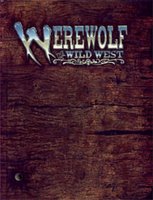 After Vampire: The Dark Ages was released, White Wolf went off on a historical bent. Titles included Werewolf: The Wild West and Mage: Sorcerer’s Crusade. Of the two, Mage was the best. Wild West really turned me off on a number of levels, mostly because it didn’t seem to deserve its own product line. That, and there were several arbitrary rules (such as those deeming that silver bullets are somehow inherently inaccurate, as compared to lead ones) that bugged me. Sorcerer’s Crusade, on the other hand, was really well done. It was stylish, useful, and seemed like it would be a lot of fun to play.
After Vampire: The Dark Ages was released, White Wolf went off on a historical bent. Titles included Werewolf: The Wild West and Mage: Sorcerer’s Crusade. Of the two, Mage was the best. Wild West really turned me off on a number of levels, mostly because it didn’t seem to deserve its own product line. That, and there were several arbitrary rules (such as those deeming that silver bullets are somehow inherently inaccurate, as compared to lead ones) that bugged me. Sorcerer’s Crusade, on the other hand, was really well done. It was stylish, useful, and seemed like it would be a lot of fun to play.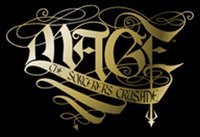 As for the other White Wolf titles, I played in a Mage game that I wasn’t horribly impressed with. The system (first edition) was too open-ended, seeming at points too open to abuse and too restricted. It was hard to determine what, precisely, a certain character could do with his powers. As was common with WW titles, this was cleaned up considerably in the second edition of the rules (which I much preferred), but we never did get to play that edition.
As for the other White Wolf titles, I played in a Mage game that I wasn’t horribly impressed with. The system (first edition) was too open-ended, seeming at points too open to abuse and too restricted. It was hard to determine what, precisely, a certain character could do with his powers. As was common with WW titles, this was cleaned up considerably in the second edition of the rules (which I much preferred), but we never did get to play that edition.Changeling? Hmm. I bought the first edition rules used for $5, just to look them over, but it’s a game I’d never play.
I bought Wraith right after its original release. I was interested in the dark aspects of the game, and in the chance to portray a ghost. As with the other WW games, the first edition didn’t do much for me. It was convoluted, the specific rules were muddy, it was hard to read. Or maybe I was just dumb. I don’t know.
I didn’t pay much more attention to it until well after the second edition was released. I bought the second edition of Wraith at a bargain basement price, and found that it was much improved over the original. Who would’ve thought it? Unfortunately, as was the case with a lot of titles I ended up liking, I got Wraith Fever just after the game had been drop-kicked by White Wolf. I guess it wasn’t popular enough. I tend to doubt that, had I discovered the second edition earlier on, the game would’ve been saved.
I’ve amassed a fairly large collection of Wraith books in the meantime, and I’m impressed with the depth of the setting material. It’s a very playable game, albeit requiring the right kinds of players. As much as I wanted to pull a game together on one or more occasions, it never worked out. Lack of interest on the part of some players played a key role at least once; time and energy (or lack thereof) was instrumental in the failure of other plans.
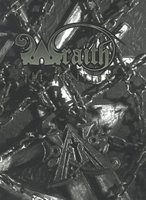 One of the interesting mechanics introduced in Wraith is that of the Shadow, a character’s dark side, the spectre within trying to get out. It acts like a little devil on your shoulder, commenting and making suggestions that aren’t always in the best interests of your character. What was most interesting about this mechanic is that your character’s Shadow is portrayed by another player, making the process incredibly interactive. Amusingly enough, this was one the big turn-offs for me when I read the first edition of Wraith. I’d have to go back and review the old rules, because I’m not entirely certain why I abhorred it then, but find it appealing today.
One of the interesting mechanics introduced in Wraith is that of the Shadow, a character’s dark side, the spectre within trying to get out. It acts like a little devil on your shoulder, commenting and making suggestions that aren’t always in the best interests of your character. What was most interesting about this mechanic is that your character’s Shadow is portrayed by another player, making the process incredibly interactive. Amusingly enough, this was one the big turn-offs for me when I read the first edition of Wraith. I’d have to go back and review the old rules, because I’m not entirely certain why I abhorred it then, but find it appealing today.My ever-evolving tastes in gaming, most likely.
I stopped buying WoD supplements as time went on. I purchased Demon: The Fallen merely because it was on sale, and I didn’t see any harm in having the core rules. I dare say I’ve only ever skimmed the contents, because I can’t for the life of me remember much about it.
For one reason or another, I’ve refrained from investing in the new World of Darkness. I find it a difficult expenditure to make, considering the vast library of supplements and core books I have that are, as of the new game’s release, obsolete. Big changes have been made in the new releases, both mechanically and thematically. I can’t say that I might not prefer the new editions over the old ones, were I to pick them up, read them, and play them. Alas, I am not wealthy enough to consider buying the WoD all over again. Besides, I like to think that I prefer the old WoD to the new one, given all the reviews I’ve read.
Yes, yes, I’m a grognard. I know.

